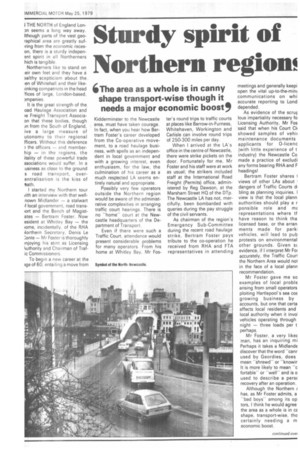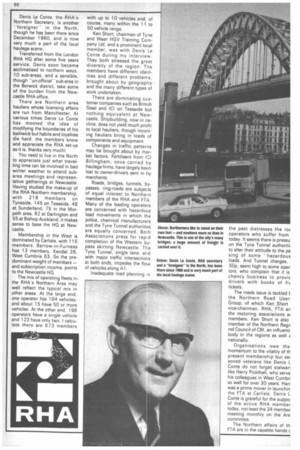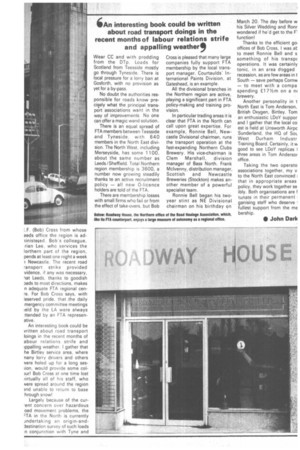Sturdy spirit of Northern region
Page 67

Page 68

Page 69

If you've noticed an error in this article please click here to report it so we can fix it.
I THE NORTH of England LonNI seems a long way away. Ithough parts of the vast georaphical area are greatly sufiring from the economic receson, there is a sturdy indepensnt spirit in all Northerners hich is tangible.
Northerners like to stand on leir own feet and they have a )althy scepticism about the 'en of Whitehall and their likelinking compatriots in the head lfices of large, London-based, )mpanies.
It is the great strength of the. oad Haulage Association and le Freight Transport Associaon that these bodies, though in from the South of England, ive a large measure of utonomy to their regional fficers. Without this deference ) the officers — and memberhip — in the regions, the itality of these powerful trade ssociations would suffer. In a usiness as close to the ground s road transport, overentralisation is the kiss of I started my Northern tour eith an interview with that well flown Midlender — a stalwart if local government, road transiort and the Bench of Magistates — Bertram Foster. Now esident at Whitley Bay — the iome, incidentally, of the RHA lorthern Secretary, Denis Le ;onte — Mr Foster is thoroughly njoying his stint as Licensing kuthority and Chairman of Trafic Commissioners.
To begin a new career at the Ige of 60, entailing a move from
Kidderminster to the Newcastle area, must have taken courage. In fact, when you hear how Bertram Foster's career developed from the Co-operative movement, to a road haulage business, with spells as an independent in local government and with a growing interest, even enthusiasm, for the law, the culmination of his career as a much respected LA seems entirely natural and appropriate.
Possibly very few operators outside the Northern region would be aware of the administrative complexities in arranging traffic court hearings. There is no "home" court at the Newcastle headquarters of the Department of Transport.
Even if there were such a Traffic Court, attendance would present considerable problems for many operators. From his home at Whitley Bay, Mr Fos ter's round trips to traffic courts at places like Barrow-in-Furness, Whitehaven, Workington and Carlisle can involve round trips of 250-300 miles per day.
When I arrived at the LA's office in the centre of Newcastle, there were strike pickets on the door. Fortunately for me, Mr Foster and his staff were at work as usual; the strikers included staff at the International Road Freight (Permits) office, administered by Reg Dawson, at the Marsham Street HQ of the DTp. The Newcastle LA has not, mercifully, been bombarded with queries during the pay struggle of the civil servants.
As chairman of the region's Emergency Sub-Committee during the recent road haulage strike, Bertram Foster pays tribute to the co-operation he received from RHA and FTA representatives in attending meetings and generally keepi open the vital up-to-the-mint communications on whi accurate reporting to Lond depended.
As evidence of the scrug bus impartiality necessary fo Licensing Authority, Mr Fos said that when his Court Cli showed samples of vehii maintenance documents applicants 'for 0-licenc (with little experience of t industry) the Newcastle Co made a practice of excludi any forms bearing RHA and F headings!
Bertram Foster shares views of other LAs about ' dangers of Traffic Courts d, bling as planning inquiries. I view is that the local plann authorities should play a r ponsible role and mt representations where tt have reason to think tha licensed base, or the arran ments made for parkl vehicles, will lead to pub protests on environmental other grounds. Given st evidence, if I interpret Mr Foi accurately, the Traffic Court the Northern Area would no in the face of a local plann recommendation.
Mr Foster gave me so examples of local proble arising from small operators ploiting Hartlepool's sea coz growing business by accounts, but one that certa affects local residents and local authority when it invol vehicles operating through night — three loads per t perhaps.
Mr Foster, a very likes 'man, has an inquiring mi Perhaps it takes a Midlands discover that the word "canr used by Geordies, does mean "shrewdor "knowir It is more likely to mean "c fortable" or -well" and is o used to describe a perm recovery after an operation.
Although the Northern has, as Mr Foster admits, a "bad boys" among its op tors, I think he would agree the area as a whole is in GE shape, transport-wise, the certainly needing a m economic boost.
Denis Le Conte, the RHA's Northern Secretary, is another "foreigner" in the North, though he has been there since December 1960, and is now very much a part of the local haulage scene.
Transferred from the London RHA HQ after some five years service, Denis soon became acclimatised to northern ways. 10 sub-areas, and a sensible, though "un-officialsub-area in the Berwick district, take some of the burden from the Newcastle RHA office.
There are Northern area hauliers whose licensing affairs are run from Manchester. At various times Denis Le Conte has mooted the idea of modifying the boundaries of his bailiwick but habits and loyalties die hard: the members know and appreciate the RHA set-up as it is, thanks very much!
You need to live in the North to appreciate just what travelling time can be involved in bad winter weather to attend subarea meetings and representative gatherings at Newcastle. Having studied the make-up of the RHA Northern membership, with 216 members on Tyneside, 145 on Teesside, 48 at Sunderland, 75 in the Morpeth area, 82 at Darlington and 55 at Bishop Auckland, it makes sense to base the HQ at Newcastle.
Membership in the West is dominated by Carlisle, with 115 members. Barrow-in-Furness has 13 members, Kendal 26, West Cumbria 63. So the predominant weight of members — and subscription income, points to the Newcastle HQ.
The mix of operating fleets in. the RHA's Northern Area may well reflect the typical mix in other areas. At the large end, one operator has 164 vehicles, and about 15 have 50 or more vehicles. At the other end, 198 operators have a single vehicle and 123 have only two. I calculate there are 673 members with up to 10 vehicles and, of course, many within the 11 to 50 vehicle range.
Ken Short, chairman of Tyne and Wear HGV Training Company Ltd, and a prominent local member, was with Denis Le Conte during my interview. They both stressed the great diversity of the region. The members have different identities and different problerrs, brought about by geography and the many different types of work undertaken.
There are dominating customer companies such as Briti3h Steel and ICI on Teesside but nothing equivalent at New castle. Shipbuilding, now in cecline, does not yield much profit to local hauliers, though incoming hauliers bring in loads of components and equipment.
Changes in traffic patterns may be brought about by mar ket factors. Fertilisers from 101 Billingham, once carried by haulage firms, have largely been lost to owner-drivers sent in by merchants.
Roads, bridges, tunnels, bypasses, ring-roads are subjects of equal interest to Northern members of the RHA and FTA_ Many of the leading operators are concerned with hazardous load movements in which the police, chemical manufacturers and the Tyne Tunnel authorities are equally concerned. Boih Associations press for rapid completion of the Western by pass skirting Newcastle. The Tyne Tunnel, single lane, ard with major traffic intersections at both ends, impedes the floN of vehicles along Al Inadequate road planning n the past distresses the roE operators who suffer from today. It seems there is pressu on the Tyne Tunnel authoriti• to alter their attitude to the pa sing of some "hazardous loads. And Tunnel charges, 50p, seem high to some oper tors, who complain that it is chancy business to provic drivers with books of fi% tickets.
The roads issue is tackled the Northern Road User: Group, of which Ken Short vice-chairman. RHA, FTA an the motoring associations al members. Ken Short is also member of the Northern Regii nal Council of CBI, an influenti, body in the regions as well E nationally.
Organisations owe the momentum to the vitality of th present membership but set soned veterans like Denis L Conte do not forget stalwar like Harry Pickthall, who serve his colleagues in West Cumbri so well for over 30 years. Harr was a prime mover in launchin the FTA at Carlisle. Denis L Conte is grateful for the suppoi of the active RHA member today, not least the 34 member meeting monthly on the Are committee.
The Northern affairs of th FTA are in the capable hands H F. (Bob) Cross from whose eeds office the region is ad iiniste;ed. Bob's colleague, rian Lee, who services the lorthern part of the region, pends at least one night a week Newcastle. The recent road ransport strike provided vidence, if any was necessary, lat Leeds, thanks to goodish Dads to most directions, makes n adequate FTA regional cenre. For Bob Cross says, with leserved pride, that the daily mergency committee meetings ield by the LA were always ttended by an FTA represenative.
An interesting book could be vritten about road transport loings in the recent months of abour relations strife and ippalling weather. I gather that he Birtley service area, where nany lorry drivers and others vere holed up for a long ses;ion, would provide some col)ur! Bob Cross at one time lost rirtually all of his staff, who vere spread around the region )ind unable to return to base .hrough snow!
Largely because of the cur.ent concern over hazardous oad movement problems, the :TA in the North is currently indertaking an origin-andiestination survey of such loads n conjunction with Tyne and
Wear CC and with prodding from the DTp. Loads for Scotland from Teesside mostly go through Tyneside. There is local pressure for a lorry ban at Gosforth, with no provision as yet for a by-pass.
No doubt the authorities responsible for roads know precisely what the principal i transport associations want n the way of improvements. No one can offer a magic wand solution.
There is an equal spread of FTA members between Teesside and Tyneside, with 640 members in the North East division. The North West, including Merseyside, has some 1100, about the same number as Leeds/Sheffield. Total Northern region membership is 3600, a number now growing steadily thanks to an active recruitment policy — all new 0-licence holders are told of the FTA.
There are membership losses with small firms who fail or from the effect of take-overs, but Bob Cross is pleased that many large companies fully support FTA membership by the local transport manager. Courtaulds' International Paints Division, at Gateshead, is an example.
All the divisional branches in the Northern region are active, playing a significant part in FTA policy-making and training provision.
In particular trading areas it is clear that FTA in the North can call upon great expertise. For example, Ronnie Bell, Newcastle Divisional chairman, runs the transport operation at the fast-expanding Northern Clubs Brewery. His vice-chairman is Clem Marshall, division manager of Bass North. Frank Mclvenny, distribution manager, Scottish and Newcastle Breweries (Stockton) makes another member of a powerful specialist team.
Ronnie Bell began his twoyear stint as NE Divisional chairman on his birthday on March 20. The day before w his Silver Wedding and Ronr wondered if he'd get to the F function!
Thanks to the efficient go. offices of Bob Cross, I was at to meet Ronnie Bell and s something of his transpc operations. It was certainly tonic, in an area dogged recession, as are few areas in t South — save perhaps Cornw — to meet with a compa spending £1 71/2m on a nt brewery.
Another personality in t North East is Tom Anderson, British Oxygen, Birtley. Tom an enthusiastic LDoY suppor and I gather that the local co est is held at Unsworth Airpc Sunderland, the HQ of SoL West Durham Industr Training Board. Certainly, it sn good to see LDoY replicas 1 three areas in Tom Andersor office.
Taking the two operato associations together, my v to the North East convinced I that in appropriate areas policy, they work together se ibly. Both organisations are 1 tunate in their permanent ganising staff who deserve fullest support from the me bership.
• John Dark




























































































































